Posts: 298
Threads: 29
Joined: Dec 2019
City: Elkhart
State, Province, Country: Indiana
Thanks for the helpful tips, I think I might go ahead with the RCP Unit as that one seems like it might be the easiest one to get going.
I don't have a modern solid state shortwave radio unfortunately, so I will have to get a frequency counter online and wire it up to the unit using one of the outputs (probably the RF Output jack I'm assuming).
Posts: 298
Threads: 29
Joined: Dec 2019
City: Elkhart
State, Province, Country: Indiana
Posts: 1,181
Threads: 48
Joined: Oct 2017
City: Allendale, MI
Nice! Recapped and all new resistors. That Selenium rectifier (green finned device) will probably need to be changed some day. I would presume the manual gives voltages. If not and the unit is working good now, you may want to measure the B+ voltages and write them down. If the Selenium rectifier is replaced with silicone, the voltage will be higher and a dropping resistor will need to be added to get the B+ back to where it should be.
Congrats on a nice unit!
(This post was last modified: 04-21-2020, 02:14 PM by rfeenstra.)
Posts: 298
Threads: 29
Joined: Dec 2019
City: Elkhart
State, Province, Country: Indiana
Thanks, I was thinking I would use a 1N4007 Diode in place of the old Selenium.
It doesn't give any voltages in the manual but the selenium rectifier that's in the unit isn't very big so more than likely a 1N4007 Diode will work fine in there and won't requiire too much voltage dropping.
This thing does have a Dedicated RF Ouput which means that I should be able to hook up a frequency counter to this thing no problem the RF Output according to the specs is capable of outputing in excess of 100,000 microvolts which should be no problems for a frequency counter.
Posts: 755
Threads: 48
Joined: Feb 2013
City: Shenandoah,
State, Province, Country: Pennsylvania
Hi Captain, one problem with connecting a frequency counter to the RF output is that the counter needs a certain signal strength level to operate properly. So when you turn down the output with the 3 position step control or the RF output control, the signal level can drop below the strength needed for the counter. That’s why I altered my SG-8 as in post #14. I repurposed the AF input jack, as I have no need for an audio input to my generator, and wired it through a DC blocking cap to the input to the attenuator, thus insuring full strength to my counter regardless of what the attenuators are set to. Something you might want to consider. Your generator looks pristine, good catch!
Ron
Bendix 0626. RCA 8BX5. RCA T64
Philco 41-250. Philco49-500
GE 201. Philco 39-25
Motorola 61X13. Philco 46-42 Crosley 52TQ
Philco 37-116. Philco 70
AK 35 Philco 46-350
Philco 620B. Zenith Transoceanic B-600
Philco 60B. Majestic 50
Philco 52-944. AK 84
Posts: 298
Threads: 29
Joined: Dec 2019
City: Elkhart
State, Province, Country: Indiana
Quote:Hi Captain, one problem with connecting a frequency counter to the RF output is that the counter needs a certain signal strength level to operate properly. So when you turn down the output with the 3 position step control or the RF output control, the signal level can drop below the strength needed for the counter. That’s why I altered my SG-8 as in post #14. I repurposed the AF input jack, as I have no need for an audio input to my generator, and wired it through a DC blocking cap to the input to the attenuator, thus insuring full strength to my counter regardless of what the attenuators are set to. Something you might want to consider. Your generator looks pristine, good catch!
Maybe you could draw out a diagram and a parts list for me so I know what to wire where and what value of capacitor to use to do the conversion. I already have the test leads on order and the BNC jacks on order I just need to see what goes where so I can make the same modification to mine.
Also as far as the RF Output goes, All I would need the frequency counter for would be to dial in the IF frequency or the Dial Alignment stations, which I would just boost the RF output just enough for that and then just disconnect it when its not needed, problem solved.
I will also be getting the old Radio City Products Signal Generator today as well so I can also see what I could do with that one as well.
Posts: 358
Threads: 4
Joined: Aug 2015
City: Monteith, Ontario CA
Quote:All I would need the frequency counter for would be to dial in the IF frequency or the Dial Alignment stations, which I would just boost the RF output just enough for that and then just disconnect it when its not needed,
To do what you describe above, you don't really need a counter or any modifications. I am not advising against it. In fact, if you'll enjoy doing the mod's, then go for it, but .... more economically, to get your sig-gen frequency set all you need is a newer, digital radio to listen to the sig-gen. That will be as accurate as you'll need, given that your sig-gen will drift a little bit all the time that you are using it. For basic AM/SW radios it will be fine and even a little bit of drift will not materially affect your alignment work.
Posts: 298
Threads: 29
Joined: Dec 2019
City: Elkhart
State, Province, Country: Indiana
Quote:To do what you describe above, you don't really need a counter or any modifications. I am not advising against it. In fact, if you'll enjoy doing the mod's, then go for it, but .... more economically, to get your sig-gen frequency set all you need is a newer, digital radio to listen to the sig-gen. That will be as accurate as you'll need, given that your sig-gen will drift a little bit all the time that you are using it. For basic AM/SW radios it will be fine and even a little bit of drift will not materially affect your alignment work.
Well I would also be doing some work on AM/FM Radios as well as AM/FM Stereo Receivers. But for the most part most of the radios I work on are older AM/SW or AM only radios.
But this Signal Generator does have a Vernier Style Tuner which is a little bit easier to dial in than a Non-Vernier Tuner.
Posts: 755
Threads: 48
Joined: Feb 2013
City: Shenandoah,
State, Province, Country: Pennsylvania
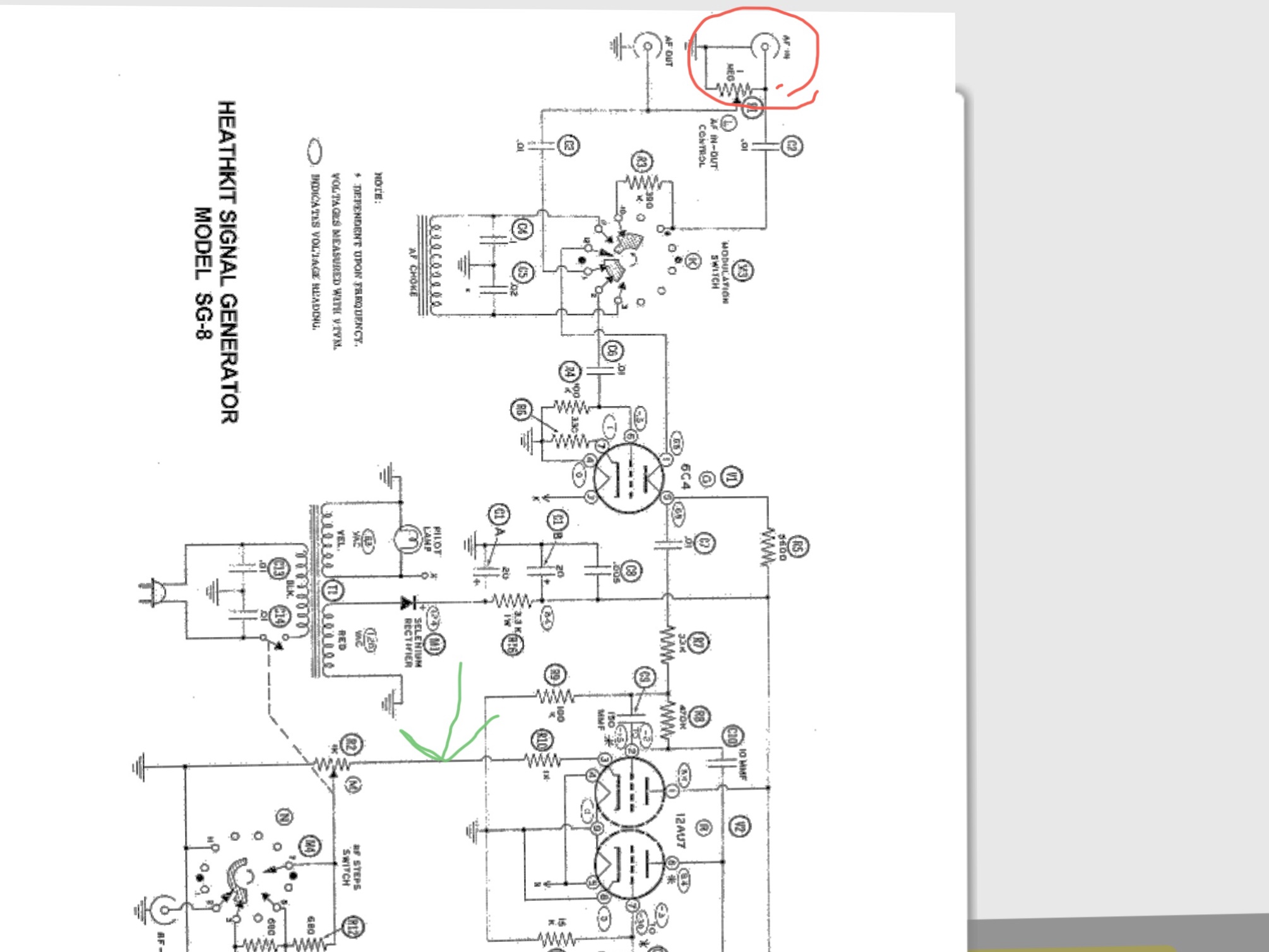
Hi Captain, you can do as you said and just connect the RF OUTPUT to the frequency counter and then adjust the generator to your desired frequency, the disconnect it. My experience with my SG-8 is that it’s not very stable, necessitating constant readjustment. My alteration allows constant monitoring of the generator frequency without constantly connecting and disconnecting the counter to the RF output. Up to you. If you want to do the change, disconnect the AF INPUT jack from everything circled in red, add a .001mfd cap to the jack and the other end to the circuit with the green arrow! Now, no matter what setting you use for the attenuators, the counter always gets full signal level. Using BNC jacks makes it easy to connect a modern lead with BNC ends to the input of a modern frequency counter. This is a fairly quick and inexpensive change to your SG-8!
Ron
Bendix 0626. RCA 8BX5. RCA T64
Philco 41-250. Philco49-500
GE 201. Philco 39-25
Motorola 61X13. Philco 46-42 Crosley 52TQ
Philco 37-116. Philco 70
AK 35 Philco 46-350
Philco 620B. Zenith Transoceanic B-600
Philco 60B. Majestic 50
Philco 52-944. AK 84
Posts: 755
Threads: 48
Joined: Feb 2013
City: Shenandoah,
State, Province, Country: Pennsylvania
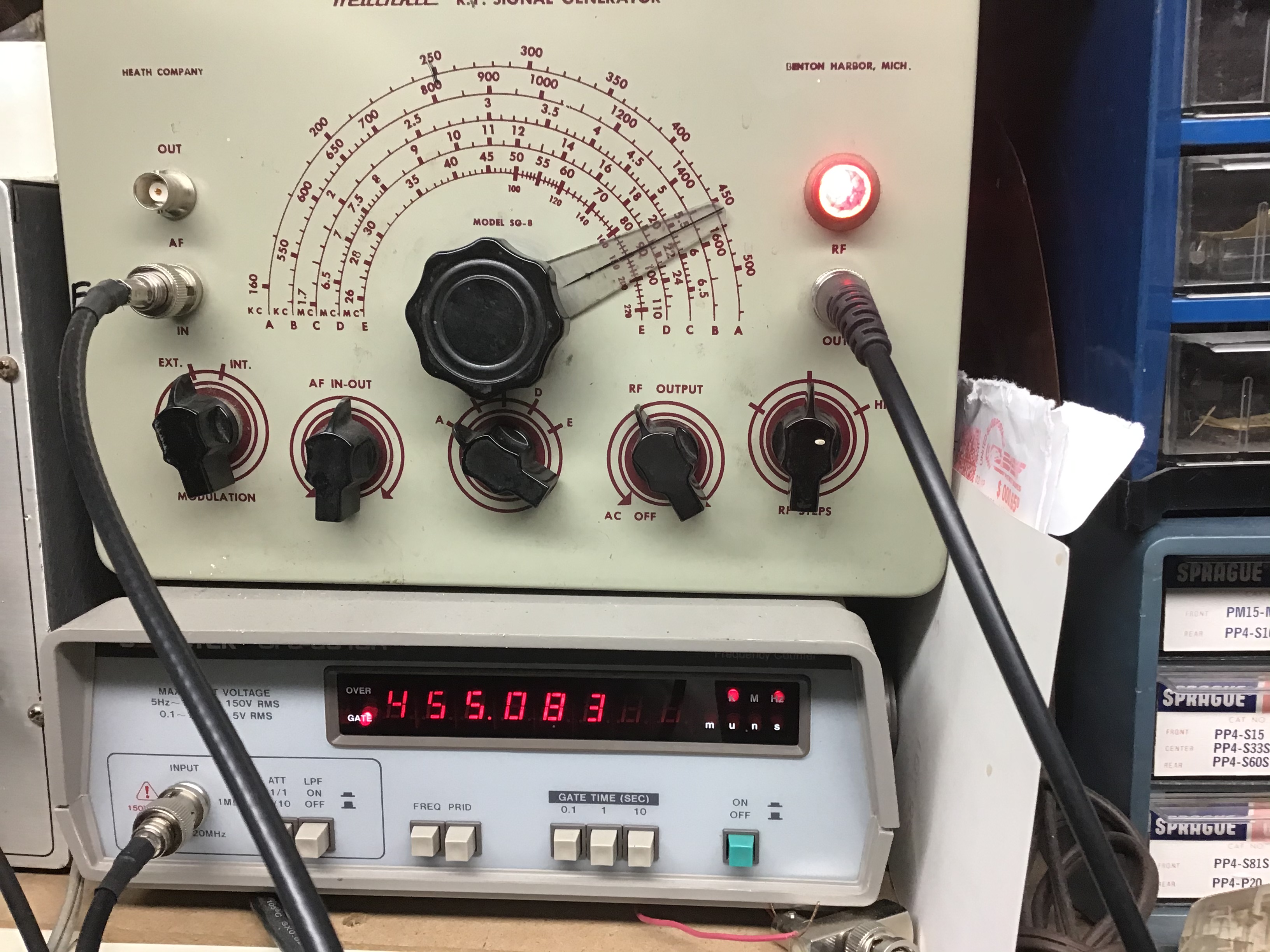
Just a quick pic of my setup!
Ron
Bendix 0626. RCA 8BX5. RCA T64
Philco 41-250. Philco49-500
GE 201. Philco 39-25
Motorola 61X13. Philco 46-42 Crosley 52TQ
Philco 37-116. Philco 70
AK 35 Philco 46-350
Philco 620B. Zenith Transoceanic B-600
Philco 60B. Majestic 50
Philco 52-944. AK 84
Posts: 298
Threads: 29
Joined: Dec 2019
City: Elkhart
State, Province, Country: Indiana
Nice! Alight that was helpful, I think I can do that.
Although I think this other signal generator I got does definitely have a monitoring output for a frequency counter.
Posts: 298
Threads: 29
Joined: Dec 2019
City: Elkhart
State, Province, Country: Indiana
[Image: https://philcoradio.com/phorum/attachment.php?aid=22108] Hi Captain, you can do as you said and just connect the RF OUTPUT to the frequency counter and then adjust the generator to your desired frequency, the disconnect it. My experience with my SG-8 is that it’s not very stable, necessitating constant readjustment. My alteration allows constant monitoring of the generator frequency without constantly connecting and disconnecting the counter to the RF output. Up to you. If you want to do the change, disconnect the AF INPUT jack from everything circled in red, add a .001mfd cap to the jack and the other end to the circuit with the green arrow! Now, no matter what setting you use for the attenuators, the counter always gets full signal level. Using BNC jacks makes it easy to connect a modern lead with BNC ends to the input of a modern frequency counter. This is a fairly quick and inexpensive change to your SG-8!
Hi Ron, I have a .001 MFD 2,000 VDC Ceramic Disc Capacitor, would that work for the DC Blocking Capacitor for the above modification?
Also is the spot pictured below the spot I would attach the old AF Input Jack and capacitor modification at?
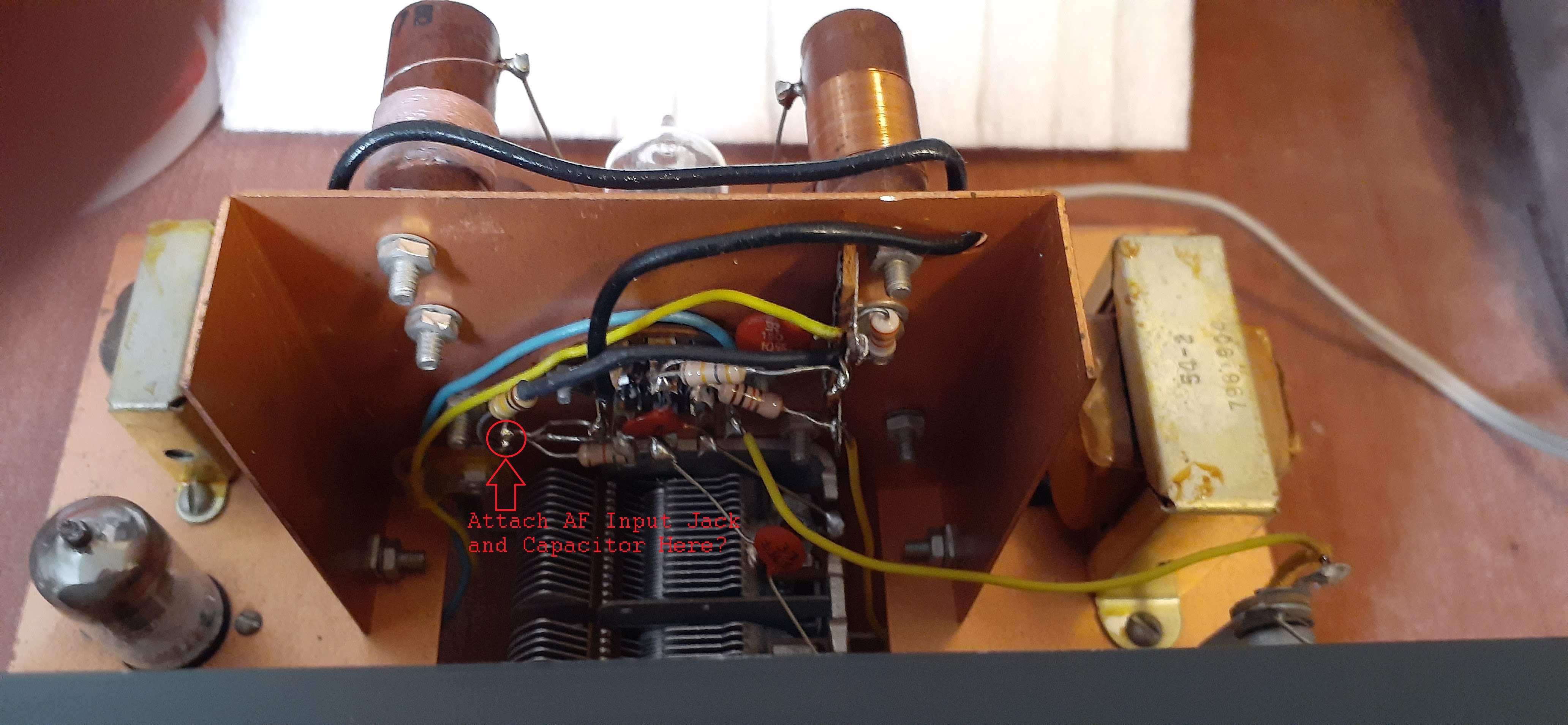
Thanks,
Levi
Posts: 755
Threads: 48
Joined: Feb 2013
City: Shenandoah,
State, Province, Country: Pennsylvania
Yes that Cap you have will do fine. It’s a bit hard for me to see on your pic if that’s the green point I mentioned as a connection point. It will be the junction of R10 and the ungrounded end of the RF Output control.
Ron
Bendix 0626. RCA 8BX5. RCA T64
Philco 41-250. Philco49-500
GE 201. Philco 39-25
Motorola 61X13. Philco 46-42 Crosley 52TQ
Philco 37-116. Philco 70
AK 35 Philco 46-350
Philco 620B. Zenith Transoceanic B-600
Philco 60B. Majestic 50
Philco 52-944. AK 84
Posts: 298
Threads: 29
Joined: Dec 2019
City: Elkhart
State, Province, Country: Indiana
My Radio City Products Signal Generator came in the mail today.
It does indeed have a High and Low RF Signal output connection, of which one is a banana plug hookup and thr other is the old Microphone style hookup like my Heathkit unit had on it, which has a old style mic jack to RCA style jack adaptor, which I might be able to swap it out for a BNC jack, because its the jack that could be used as a monitoring jack for a frequency counter, because it doesn't go through the attenuator, like the low RF output does, according to the manual.
I will need to recap it as it does have its original paper caps in it yet, thankfully they are common enough values that I can work with.
It also had its original filter caps replaced at some point in time, but they were just 20/20 at 450VDC caps and I can just stick some new 22mfd @ 450 VDC electrolytics in there pretty easily because where the caps hook in at there's a chassis ground connection on a terminal strip nearby that I can hook onto that would make for a nice clean connection.
They even included a new power cord for me to replace the original power cord which was shot.
This definitely seems like its a high accuracy unit.
pictures of the the unit posted below.
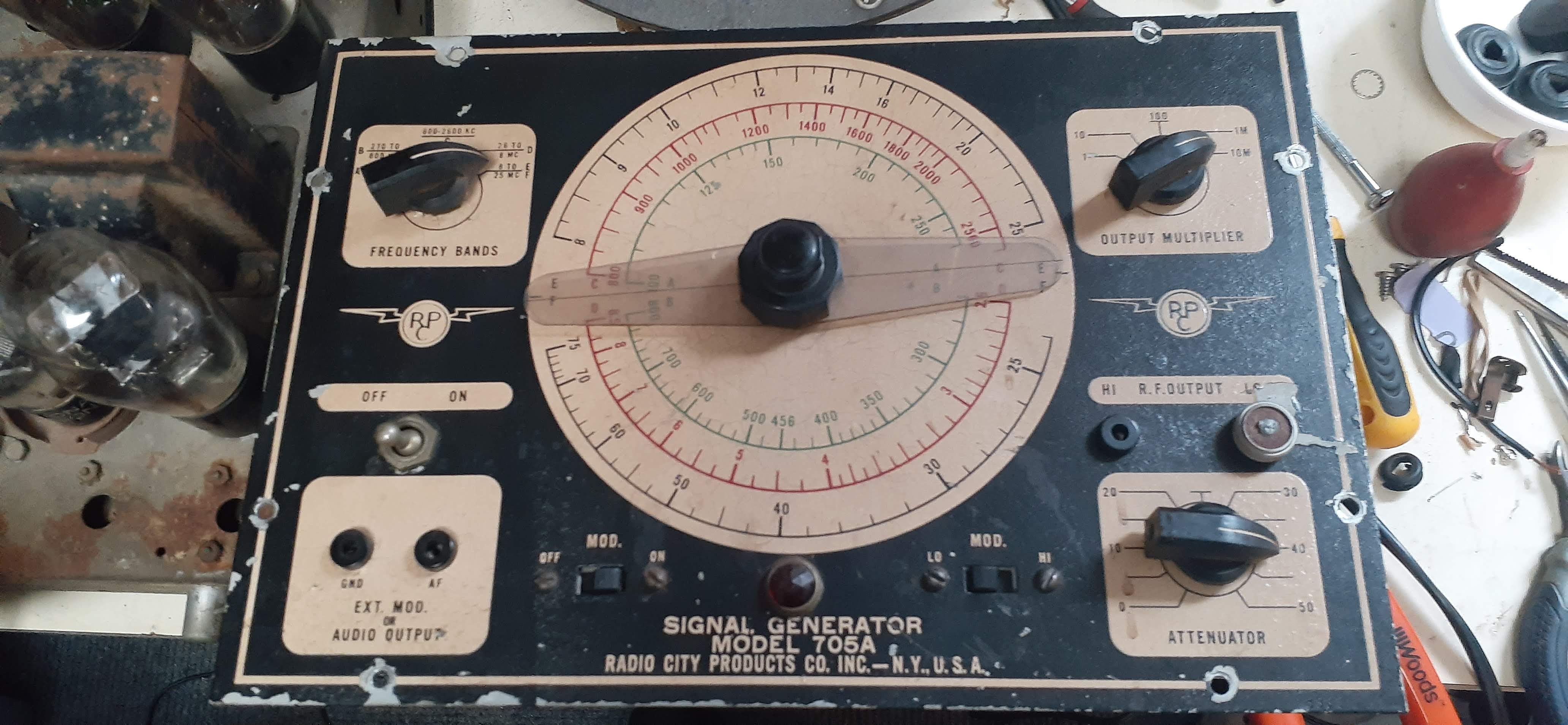
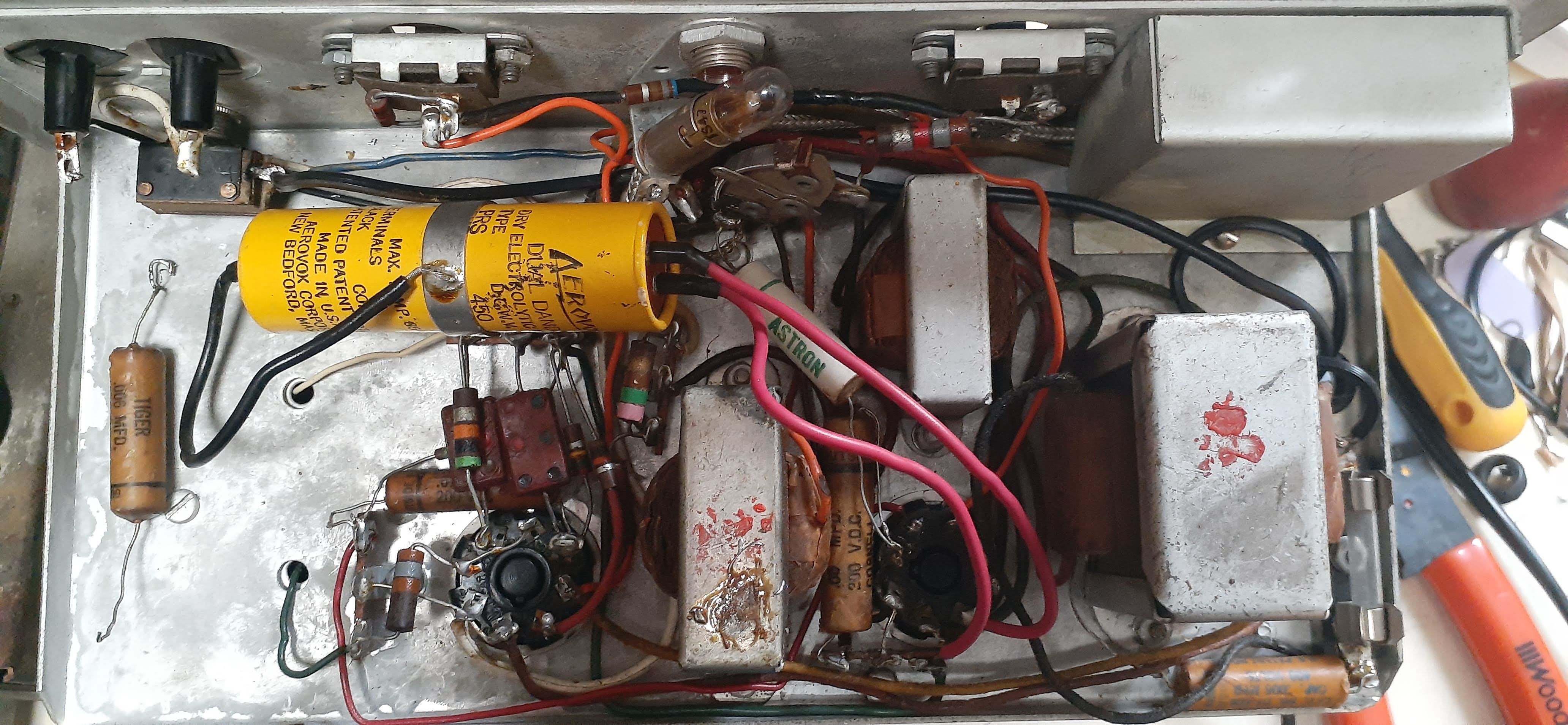
Posts: 298
Threads: 29
Joined: Dec 2019
City: Elkhart
State, Province, Country: Indiana
OK I got the modification done, I have a picture posted below of the modification.
Also in case you are wondering, the .001 MFD ceramic disc capacitor isn't touching the tuning capacitor its floating in the air above it.
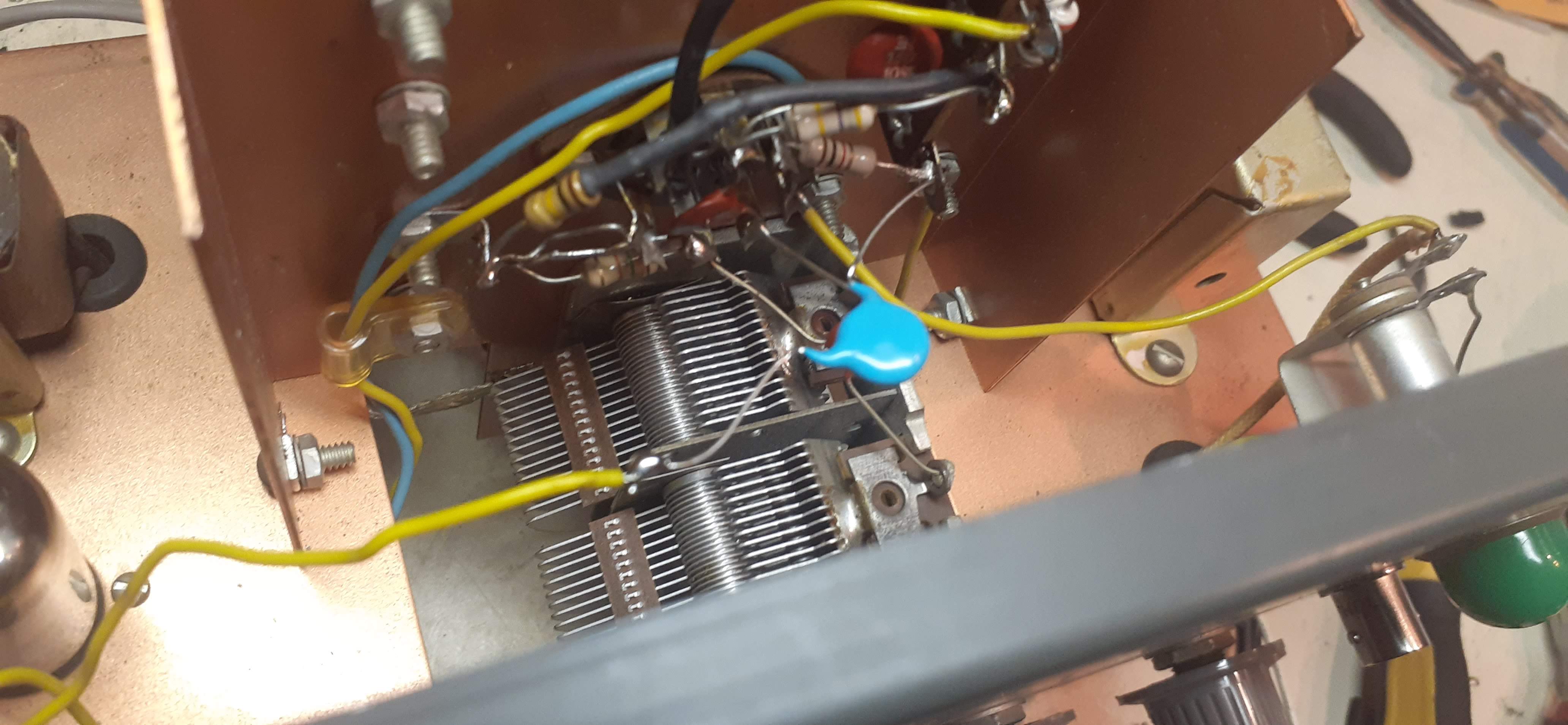
Users browsing this thread: 1 Guest(s)
|



